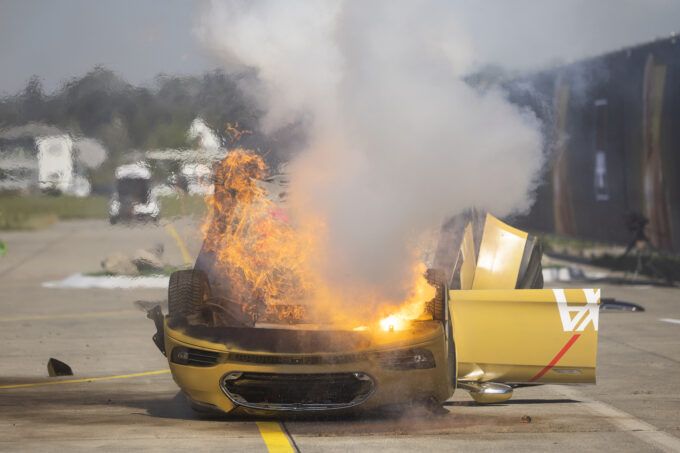Crash tests: E-Power increases accident risk 🎥
BACKGROUND Electromobility is booming. But electric cars cause more collisions than internal combustion vehicles, especially the high-performance models. Accident researchers showed why this is so in crash tests.
Electromobility has become one of the biggest trends in the automotive industry. Almost half of the population believes that electrification will fundamentally change mobility. This is shown by this year's AXA mobility study. Interest in battery-powered vehicles is almost unstoppable.
Around a third of the people surveyed have already been behind the wheel of an electric vehicle; among the men taking part, the figure is just under half. Almost 50 percent of those surveyed can already imagine purchasing a battery-powered vehicle in the future. And those who already own one are not likely to give it up in the near future.

The more power, the higher the accident risk
A look at the statistics shows that drivers of electric cars cause 50 percent more collisions with damage to their own vehicles than those of conventional combustion cars.
Drivers of high-performance electric cars even cause more than twice as many self-inflicted injuries due to collisions than those of standard burners.
Michael Pfäffli, Head of Accident Research and Prevention at AXA: "Specifically, there is a 30 percent increase in damage to third parties, so-called liability damage, in high-performance models. The reason for this is probably related not least to the powerful lithium-ion batteries of electric cars: The battery is the heart of electric cars. It not only influences the performance and thus the driving behavior of the vehicles, but also their weight and construction. In addition, the battery has a decisive influence on rescue and recovery operations."
Overtapping effect can become dangerous
The driving behavior of high-performance electric vehicles in particular differs significantly from that of internal combustion vehicles. According to the study, more than 50 percent of electric car drivers had to adjust their driving behavior at the beginning, surprisingly especially their braking behavior.
However, the analyses show that the greatest risks are not when reducing speed, but when accelerating. Many apparently underestimate the so-called overtapping effect.
Most electric cars, especially the powerful ones, have a very high torque, which is immediately noticeable when the electric pedal is tapped. This can lead to unintended, jerky acceleration, which the driver can no longer control.
The risk of fire in cars is overestimated
If the battery is damaged in an accident, a fire could be the result. However: The risk of fire in cars, regardless of whether they are gasoline or electricity powered, is very low and is greatly overestimated among the Swiss population.
Statistically, only five out of 10,000 cars fall victim to a fire. But a look at the statistics shows that electric cars do not burn more often than combustion cars.
To date, there is no satisfactory solution for extinguishing fires in electric vehicles in a safe, fast, environmentally friendly and cost-effective manner. From a firefighting perspective, it is important that emergency forces can get to the inside of the battery as quickly and directly as possible, he said.
... and this is what you must pay attention to
... drivers of electric cars should be aware of unintended rapid acceleration (the overtapping effect). The handling of this immediate force must be learned. If possible, drivers should manually downshift the amount of acceleration to achieve greater resistance when tapping the electric pedal.
... drivers of electric vehicles should keep a special eye on the underbody. Driving over road islands, stones or traffic circles, for example, should be avoided if possible to prevent damage to the underbody.
... Drivers of heavy vehicles tend to have a higher level of personal safety. For this very reason, they should be aware of their responsibility towards other road users: lighter vehicles are at a disadvantage in the event of a crash.
Very important:
First aid is mandatory, even in the event of accidents involving electric cars. Fears of suffering an electric shock when rescuing a person are unfounded in most cases.












